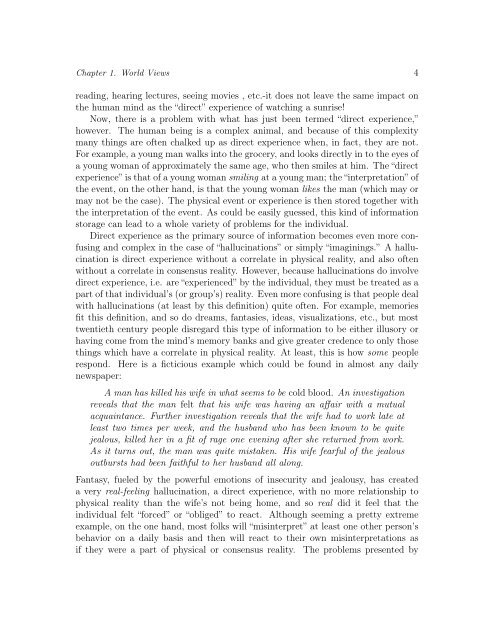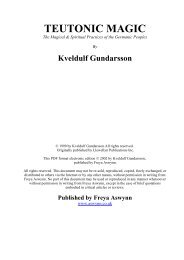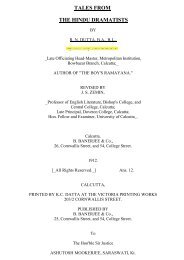Untitled - Awaken Video
Untitled - Awaken Video
Untitled - Awaken Video
You also want an ePaper? Increase the reach of your titles
YUMPU automatically turns print PDFs into web optimized ePapers that Google loves.
Chapter 1. World Views 4<br />
reading, hearing lectures, seeing movies , etc.-it does not leave the same impact on<br />
the human mind as the “direct” experience of watching a sunrise!<br />
Now, there is a problem with what has just been termed “direct experience,”<br />
however. The human being is a complex animal, and because of this complexity<br />
many things are often chalked up as direct experience when, in fact, they are not.<br />
For example, a young man walks into the grocery, and looks directly in to the eyes of<br />
a young woman of approximately the same age, who then smiles at him. The “direct<br />
experience” is that of a young woman smiling at a young man; the “interpretation” of<br />
the event, on the other hand, is that the young woman likes the man (which may or<br />
may not be the case). The physical event or experience is then stored together with<br />
the interpretation of the event. As could be easily guessed, this kind of information<br />
storage can lead to a whole variety of problems for the individual.<br />
Direct experience as the primary source of information becomes even more confusing<br />
and complex in the case of “hallucinations” or simply “imaginings.” A hallucination<br />
is direct experience without a correlate in physical reality, and also often<br />
without a correlate in consensus reality. However, because hallucinations do involve<br />
direct experience, i.e. are “experienced” by the individual, they must be treated as a<br />
part of that individual’s (or group’s) reality. Even more confusing is that people deal<br />
with hallucinations (at least by this definition) quite often. For example, memories<br />
fit this definition, and so do dreams, fantasies, ideas, visualizations, etc., but most<br />
twentieth century people disregard this type of information to be either illusory or<br />
having come from the mind’s memory banks and give greater credence to only those<br />
things which have a correlate in physical reality. At least, this is how some people<br />
respond. Here is a ficticious example which could be found in almost any daily<br />
newspaper:<br />
A man has killed his wife in what seems to be cold blood. An investigation<br />
reveals that the man felt that his wife was having an affair with a mutual<br />
acquaintance. Further investigation reveals that the wife had to work late at<br />
least two times per week, and the husband who has been known to be quite<br />
jealous, killed her in a fit of rage one evening after she returned from work.<br />
As it turns out, the man was quite mistaken. His wife fearful of the jealous<br />
outbursts had been faithful to her husband all along.<br />
Fantasy, fueled by the powerful emotions of insecurity and jealousy, has created<br />
a very real-feeling hallucination, a direct experience, with no more relationship to<br />
physical reality than the wife’s not being home, and so real did it feel that the<br />
individual felt “forced” or “obliged” to react. Although seeming a pretty extreme<br />
example, on the one hand, most folks will “misinterpret” at least one other person’s<br />
behavior on a daily basis and then will react to their own misinterpretations as<br />
if they were a part of physical or consensus reality. The problems presented by
















